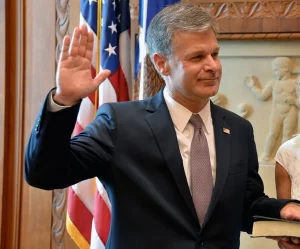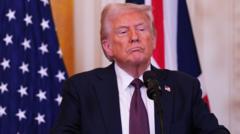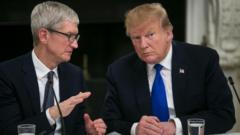Christopher Wray’s unexpected resignation from the FBI comes at a critical juncture, influenced largely by President Trump’s nomination of Kash Patel, potentially shifting the agency's operational focus.
FBI Director Christopher Wray Resigns Amid Political Pressure as Trump Prepares for Inauguration

FBI Director Christopher Wray Resigns Amid Political Pressure as Trump Prepares for Inauguration
Wray's resignation after intense scrutiny raises concerns about the future direction of the FBI under Trump’s administration.
FBI Director Christopher Wray announced his resignation on Wednesday, leaving his post earlier than anticipated, only seven years into his ten-year term. This departure arises from growing pressure, notably from President Donald Trump, who urged Wray to step down ahead of the January 20 inauguration of President-elect Trump. This development signifies a crucial turning point for the FBI and poses questions regarding its leadership moving forward.
Reacting to Wray's announcement, President-elect Donald Trump issued a statement declaring it "a great day for America." Wray's resignation statement highlighted his dedication to the Bureau, noting the difficulties posed by this decision. "It should go without saying, but I’ll say it anyway — this is not easy for me," he commented. He conveyed his affection for the FBI and its personnel, prioritizing the agency's integrity during a politically volatile time. "My focus is, and always has been, on us and doing what’s right for the FBI," Wray added.
The selection of Kash Patel as the next FBI Director has been pivotal in Wray’s resignation. Reports suggest that Wray faced an ultimatum: resign voluntarily or be terminated. This maneuver has ignited intense discussions among political analysts, legal experts, and within the FBI regarding the ramifications of a leadership change in such a charged environment.
Wray's leadership was characterized by high-profile inquiries that garnered criticism from both political factions. Nevertheless, Wray made it a priority to protect the Bureau's independence from political influences, focusing on its primary mission of safeguarding the American populace. His resignation not only underscores external pressures but also reflects his commitment to preserving the agency's nonpartisan nature.
Kash Patel's impending appointment indicates a potential shift in the Bureau's focus and operations. Known for his unwavering allegiance to Trump, Patel could precipitate significant changes in the FBI's approach and priorities.
This pivotal moment in FBI leadership is expected to have substantial repercussions for the agency’s future. Wray's resignation emphasizes the fragile balance between law enforcement and political dynamics, as the FBI embarks on a new chapter amidst evolving challenges and societal expectations.




















